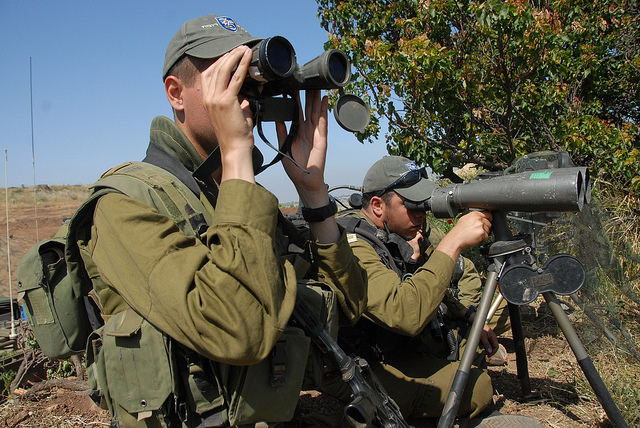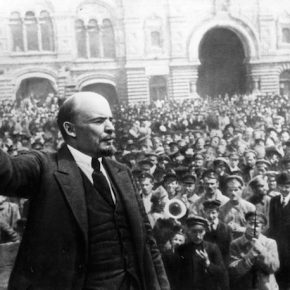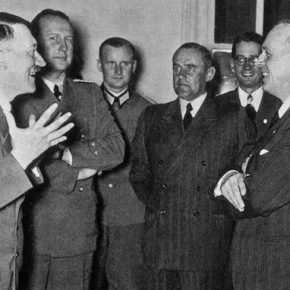Despite its official policy of non-intervention, Israel has taken on a very proactive role in Syria, working to establish an Israel-friendly zone in Quneitra, akin to its strategy in southern Lebanon during the Lebanese Civil War.
QUNEITRA, Syria – Over the past five years, Israel has been quietly working to establish a foothold in southern Syria to prevent Syrian government-backed forces from controlling the area and to bolster its claim over the Golan Heights.
What began as tentative contacts with opposition factions and residents across the fence in 2012 has turned into a full-fledged, multifaceted operation that has military, logistical, political and humanitarian dimensions, according to an investigation by Syria Deeply, which interviewed residents, Syrian intelligence officials and opposition members for this story.
Israel’s “safe zone” now unofficially runs roughly 6 miles (10km) deep and 12 miles (20km) long beyond the demarcation line of the Israeli-occupied Golan Heights. The effort is intended to prevent the Syrian government and its allies, specifically Lebanon’s Hezbollah and the Iranian Revolutionary Guards, from maintaining a foothold along the Israeli fence. Israel used a similar tactic to establish a zone of control in the south of Lebanon during the Lebanese Civil War.
In 2016, the Israeli army set up a liaison unit to better coordinate with Syrian residents, which now includes facilitating cross-border travel for residents into Israel, regular deliveries of food, clothing, construction equipment and educational materials, airstrikes on pro-government positions and the establishment of an Israeli-backed opposition faction in rebel-held southern Syria.
It is now a near-daily occurrence to see Israeli-run buses coming in and out of southern Syria, transporting residents from the opposition-controlled province of Quneitra into Israel. Most are coming in for medical treatment, generally given at Ziv Hospital in Safad, Western Galilee Hospital in Nahariya or Rambam Health Care in Haifa. Some patients stay a few days, a month or up to a year and a half, during which time they are given the opportunity to learn Hebrew and adapt to their new surroundings.
According to the most recent UNDOF report, there has been “a significant increase in interaction” between the Israeli army and those within opposition-controlled areas along the fence, and “personnel and supplies were observed to have been transferred in both directions.”
A Syrian man who goes by the name of Abu Nidal coordinates with Israeli forces and “facilitates the transportation of residents to the border area, [where they are] then picked up by the Israeli army and taken into Israel,” Abu Ahmad, a member of a local opposition civil administrative council inside Quneitra City, told Syria Deeply.
A Syrian government intelligence source, speaking to Syria Deeply on the condition of anonymity due to the sensitivity of the situation, claimed Abu Nidal’s real name is Ahmad al Safouri and that he is originally from Nafha village in the Golan and now based in Maalqah – an opposition-controlled village meters away from the demarcation line. He added that Abu Nidal “uses two crossings into Israel, one at Maalqah and one in the Mari’e Valley.”
Abu Nidal apparently belongs to no faction, and runs a network of “several, at least 20, representatives that operate and coordinate bringing out Syrians and bringing in material at these crossings,” Abu Ahmad said.
Israeli civil society organizations, such as Amaliah, Israeli Flying Aid Organization and Shevet Achim, also coordinate through the Israeli army’s liaison unit to reach residents and local opposition councils in roughly 35 villages between them, providing education services and trucking in medical aid, food and clothing.
“The Israelis are working closely with civil society people on the ground,” a commander with the Jordan-backed Southern Front, who also has a presence in the area, told Syria Deeply on condition of anonymity. “We know it is happening, but we don’t want to have issues with the local population, so there is nothing we can do to stop it.”
Amaliah’s primary mission is to create a safe zone in southern Syria, eventually expanding its current area of operations – approximately 17 villages – to include Quneitra, southern Daraa and part of Sweida, and start initiatives such as training local law enforcement and building schools and hospitals.
The organization’s founder, Moti Kahana, is also spearheading Israel’s decision to adopt 100 Syrian children – a proposal interior minister Aryeh Deri approved in January – providing them with foster homes, residency and eventually citizenship in Israel.
More recently, Israel has stepped up its military involvement in southern Syria. Over the past year, it has funded and supported its own Free Syrian Army faction, known as the Golan Knights (Liwa Forsan al Joulan), led by local Syrian fighters Abu Suhaib al Joulani, opposition sources in the area told Syria Deeply. The group operates in Jabata Khashab, a Quneitra town in the United Nations Disengagement Observer Force (UNDOF) zone.
A member of the Golan Knights confirmed to Syria Deeply that the group is present in Jabata Khashab and led by Abu Suhaib, but refused to answer additional questions on the factions.
Syrian government security officials identified Abu Suhaib as Ahmad al Khatib, originally from Masharah in Quneitra, and said the group consists of around 1,000 fighters. However, a high-level Southern Front source put the number at between 300 and 400 local fighters. According to the source, the faction “receives around $50,000 a month from Israel [and] they’re in possession of only light weaponry, so they act predominantly as border guards and patrol the area they’re in.
“There’s nothing we can do about them, they are from the local population,” the source added. “We’ve been having our own problems in the area, and so we cannot clash with them.”
On the political front, Israel is publicly courting officials who claim to fall under the umbrella of the Free Syrian Army, such as Issam Zeitoun and Kamal Labwani – both of whom regularly visit Israel. It has also been promoting the National Salvation Front leader Fahad al Masri, who has publicly called for Israeli intervention in Syria, as an example of a Syrian opposition figure willing to work with Tel Aviv.
The Lebanon Experience
Israel employed a similar strategy in southern Lebanon, after the Cairo Agreement of 1969, in which Egypt’s Gamal Abdel Nasser brokered a deal between Lebanese army commander Emile Bustani and Palestinian Liberation Organization leader Yasser Arafat, establishing official guidelines for Palestinian groups operating in south Lebanon, and permitting them to launch attacks against Israel.
Capitalizing on the chaos in Lebanon when civil war broke out in 1975, Israel began to establish – both covertly and overtly – its own network of south Lebanon residents, under what the Israelis called the Good Fence Policy. Israel easily filled the vacuum in the area, where the population’s many and diverse sects had recently been abandoned by the government in terms of security and financial stability.
“Israel worked on establishing an Israeli-friendly network, both military and civilian, inside southern Lebanon,” Abu Abdullah, one resident of southern Lebanon, who grew up under the Israeli occupation, told Syria Deeply, adding that Israel capitalized on and manipulated the local population’s sectarian and anti-Palestinian sentiments to solidify its grip.
“They started off by sending humanitarian and medical aid through the border crossing at Fatima’s Gate and ended with sending arms and setting up their own militia,” he said. It was not unusual for Lebanese residents to seek free medical treatment and work opportunities in Israel, where the situation was considered more stable.
In 1975, Israel established, trained and funded the Free Lebanon Army, which later rebranded as the South Lebanon Army under the leadership of former Lebanese army commander Antoine Lahd in 1980. The group targeted anyone suspected of working against Israel, setting the foundation for Israel’s occupation of south Lebanon until 2000.
Forty years later, a comparable scenario is playing out in southern Syria.
Today, a number of factions operate in areas of Quneitra along the demarcation fence, including hyper-local groups, the Jordan- and U.S.-backed Southern Front opposition coalition, the al-Qaida-linked Hayat Tahrir al-Sham and ISIS, many of which have clashed over the years. These clashes, along with government attacks and the arrival of IDPs from surrounding areas, further destabilized the area’s lack of governance and economy. The situation worsened in 2016 when Jordan effectively closed its border, preventing anyone from leaving to receive medical treatment or cross-border aid deliveries.
This created a fertile environment for Israel. Drawing from its experience in Lebanon, Israel’s strategy for control does not involve boots on the ground – but fills the gaps in basic services ensuring the population remains dependent and friendly toward its presence.
As Abu Ahmad pointed out, “We have no field hospitals that can deal with serious wounds, and the Jordanians are not giving us any help at all; can you blame a parent if their child is suffering and someone is offering them treatment in Israel?”
Beyond the Conflict in Syria
Syrian government sources have long accused Israel of coordinating with opposition factions in southern Syria, providing them with logistical aid and intelligence, and supporting their ground advances by striking pro-government positions in Quneitra.
A case in point was the Syrian army’s offensive on East Samdaniyeh in April. “When the militants could not advance, the Israeli army attacked Syrian army positions in the area using the pretext of a mortar landing in the occupied Golan,” said one Syrian government military source. “This has happened on several occasions in the past, such as during the clashes around Khan Arnabeh last year and the battle of Tel Shaar in 2015.
This article originally appeared on Syria Deeply, and you can find the original here. For important news about the war in Syria, you can sign up to the Syria Deeply email list. Photograph courtesy of the Israel Defence Forces. Published under a Creative Commons license.





